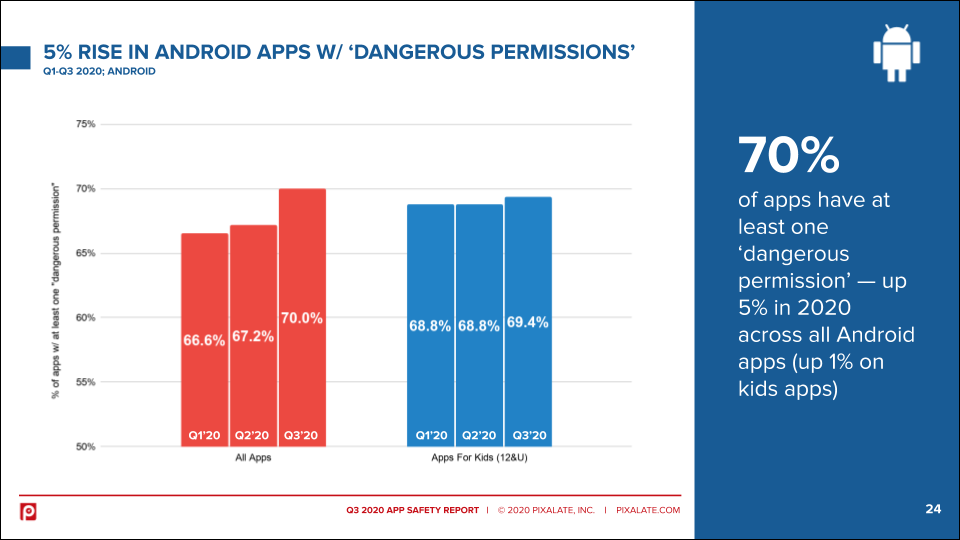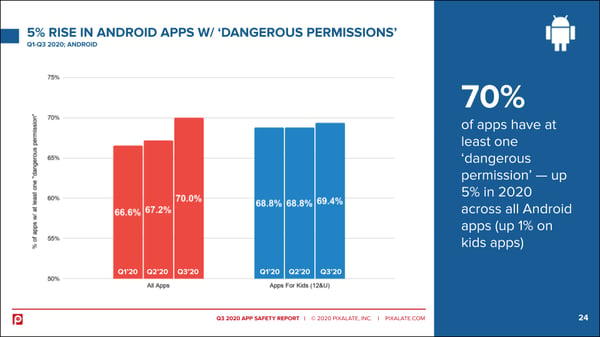
Pixalate's Mobile Ad Supply Chain: App Safety & Consumer Data Privacy Report (Q3 2020) reveals information about the 5.1+ million apps available to consumers across the Google Play and Apple App stores from Q1-Q3 2020 — with a specific look at apps for kids (aged 12 and under).
This blog examines the number of apps available on the Google Play Store that request any "dangerous permission" (as defined by Google), such as precise location access, access to the phone's camera or microphone, and more. location access (latitude and longitude GPS).

|
Permission |
Description |
|
WRITE_EXTERNAL_STORAGE |
Allows an application to write to external storage. |
|
CAMERA |
Required to be able to access the camera device. |
|
CALL_PHONE |
Allows an application to initiate a phone call without going through the Dialer user interface for the user to confirm the call. |
|
BODY_SENSORS |
Allows an application to access data from sensors that the user uses to measure what is happening inside his/her body, such as heart rate. |
|
RECORD_AUDIO |
Allows an application to record audio. |
|
READ_CALENDAR |
Allows an application to read the user's calendar data. |
|
READ_CALL_LOG |
Allows an application to read the user's call log. |
|
READ_CONTACTS |
Allows an application to read the user's contacts data. |
|
WRITE_CALENDAR |
Allows an application to write the user's calendar data. |
|
WRITE_CONTACTS |
Allows an application to write the user's contacts data. |
|
READ_PHONE_STATE |
Allows read only access to phone state, including the phone number of the device, current cellular network information, the status of any ongoing calls, and a list of any PhoneAccounts registered on the device. |
|
ANSWER_PHONE_CALLS |
Allows the app to answer an incoming phone call. |
|
ACCESS_FINE_LOCATION |
Allows an app to access precise latitude and longitude. |
|
ACCESS_COARSE_LOCATION |
Allows an app to access approximate location. |
|
ACCESS_BACKGROUND_LOCATION |
Allows an app to access location in the background. |
Inside our Q3 2020 mobile advertising app safety report, you’ll find:
Disclaimer
The content of this blog, and the Q3 2020 Mobile App Safety: Consumer Data Privacy Report (the "Report"), reflect Pixalate's opinions with respect to factors that Pixalate believes can be useful to the digital media industry. Any insights shared are grounded in Pixalate's proprietary technology and analytics, which Pixalate is continuously evaluating and updating. Any references to outside sources in the Report and herein should not be construed as endorsements. Pixalate's opinions are just that, opinions, which means that they are neither facts nor guarantees. It is important to also note that the mere fact that an app receives “dangerous permissions” (as defined by Google), does not appear to have a published registration address (or is registered in a traditional tax haven country), does not appear to have a privacy policy or terms of service, or appears to have other risk factors as set forth herein, does not necessarily mean that such app, or its publisher, is actually violating any particular law (e.g., COPPA) or is otherwise exploiting personal data. Instead, Pixalate is merely rendering an opinion that these facts may be suggestive of heightened risks to data subjects, especially with respect to children aged 12 and under. Pixalate is sharing this data not to impugn the standing or reputation of any entity, person or app, but, instead, to report facts as they pertain to Android and iOS apps.
*By entering your email address and clicking Subscribe, you are agreeing to our Terms of Use and Privacy Policy.
These Stories on Mobile
*By entering your email address and clicking Subscribe, you are agreeing to our Terms of Use and Privacy Policy.

Disclaimer: The content of this page reflects Pixalate’s opinions with respect to the factors that Pixalate believes can be useful to the digital media industry. Any proprietary data shared is grounded in Pixalate’s proprietary technology and analytics, which Pixalate is continuously evaluating and updating. Any references to outside sources should not be construed as endorsements. Pixalate’s opinions are just that - opinion, not facts or guarantees.
Per the MRC, “'Fraud' is not intended to represent fraud as defined in various laws, statutes and ordinances or as conventionally used in U.S. Court or other legal proceedings, but rather a custom definition strictly for advertising measurement purposes. Also per the MRC, “‘Invalid Traffic’ is defined generally as traffic that does not meet certain ad serving quality or completeness criteria, or otherwise does not represent legitimate ad traffic that should be included in measurement counts. Among the reasons why ad traffic may be deemed invalid is it is a result of non-human traffic (spiders, bots, etc.), or activity designed to produce fraudulent traffic.”

